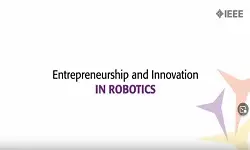-
Members: FreeRAS
IEEE Members: Free
Non-members: FreeLength: 01:00:33
31 May 2017
Video Description
Nobel Turing Challenge is one of the ultimate challenges the scientific community can tackle. It aims at (1) developing AI system including substantial robotics components that can make major scientific discoveries some of which worth Nobel Prize (called as “Scientific Discovery Challenge”), and (2) actually win the prize without the selection committee noticed that it is actually an AI system, not a human researcher (Cybernetic Personality Challenge). Primary focus on this challenge will be biomedical science area for Physiology and Medicine Award (Kitano, H., AI Magazine, 37(1) 2016).
This grand challenge project shall take a form of globally distributed “Virtual Big Science” project (Kitano, H., et al., Nature Chemical Biology, 7, 323-326, 2011). A part of the project shall resemble RoboCup (Kitano, H., et al., AI Magazine, 18(1) 73-85, 1997), but it will have substantially different aspects reflecting the difference of domains and objectives.
In the mid 90s, I advocated “Systems Biology” with the aim of promoting systems-oriented view in biology and to introduce more systematic measurements, proper applications of engineering, mathematical, and information science principles into life science (Kitano, H., Science, 295, 1662-1664, 2002; Kitano, H., Nature, 420, 206-210, 2002). This endeavor has been successful and systems biology is one of normal approach in biomedical and pharmaceutical sciences. The progress in systems biology revealed new limitations in life science that stems from our cognitive limitations to understand complex, non-linear, high dimensional, and dynamical systems, with overwhelming data and publications each of which unveils only a fragment of systems.
With recent breakthroughs in AI, exponentially increasing data production capabilities, and massive computing power, disruptive innovations in biomedical sciences are on the horizon. Time is ripe to embark on a new aggressive challenge. The fundamental breakthrough will come at the stage AI to generate hypotheses and quickly verify them using their knowledge bases, simulation, and robotics experimental systems. It means that AI systems can keep discovering new knowledge with minimal or zero human interventions. Even a mid-term achievement of Scientific Discovery Challenge alone will be a game changer. It will trigger fundamental transformations of industry and more largely on the shape of our civilization.
ICRA 2017
The 2017 IEEE International Conference on Robotics and Automation (ICRA) was held from May 29 to June 3, 2017 at Sands Expo and Convention Centre, Marina Bay Sands in Singapore. ICRA is IEEE Robotics and Automation Society's flagship conference and is a premier international forum for robotics researchers to present their work. The conference theme, “Innovation, Entrepreneurship, and Real-world Solutions”, underscores the need for innovative R&D talent, dynamic and goal-driven entrepreneurs and practitioners using robotics and automation technology to solve challenging real-world problems such as shortage of labour, an ageing society, and creating sustainable environments.
Speaker
Hiroaki Kitano is President and CEO at Sony Computer Science Laboratories, Inc., Corporate Executive at Sony Corporation, President at The Systems Biology Institute, Tokyo, Professor at Okinawa Institute of Science and Technology Graduate University, Okinawa, and Director at Laboratory for Disease Systems Modeling, RIKEN Center for Integrative Medical Sciences, Kanagawa, and a member of AI and Robotics Council of the World Economic Forum.
He received a B.A. in physics from the International Christian University, Tokyo, and a Ph.D. in computer science from Kyoto University. Since 1988, he has been a visiting researcher at the Center for Machine Translation at Carnegie Mellon University. His research career includes a Project Director at Kitano Symbiotic Systems Project, ERATO, Japan Science and Technology Corporation followed by a Project Director at Kitano Symbiotic Systems Project, ERATO-SORST, Japan Science and Technology Agency where numbers of spin-offs were created including ZMP Inc., iXs Research, RT Coporation, Flower Robotics Inc., Xiborg Inc., etc.
Kitano is a Founding President of The RoboCup Federation, a founder and president of International Society for Systems Biology (ISSB), and an Editor-in-Chief of Nature Partner Journal (npj) Systems Biology and Applications. He served as a president of International Joint Conference on Artificial Intelligence (IJCAI) during 2011-2013. Kitano received The Computers and Thought Award from the International Joint Conferences on Artificial Intelligence in 1993, Prix Ars Electronica 2000, and Nature Award for Creative Mentoring in Science 2009, as well as being an invited artist for Biennale di Venezia 2000 and Museum of Modern Art (MoMA) New York in 2001.
Nobel Turing Challenge is one of the ultimate challenges the scientific community can tackle. It aims at (1) developing AI system including substantial robotics components that can make major scientific discoveries some of which worth Nobel Prize (called as “Scientific Discovery Challenge”), and (2) actually win the prize without the selection committee noticed that it is actually an AI system, not a human researcher (Cybernetic Personality Challenge). Primary focus on this challenge will be biomedical science area for Physiology and Medicine Award (Kitano, H., AI Magazine, 37(1) 2016).
This grand challenge project shall take a form of globally distributed “Virtual Big Science” project (Kitano, H., et al., Nature Chemical Biology, 7, 323-326, 2011). A part of the project shall resemble RoboCup (Kitano, H., et al., AI Magazine, 18(1) 73-85, 1997), but it will have substantially different aspects reflecting the difference of domains and objectives.
In the mid 90s, I advocated “Systems Biology” with the aim of promoting systems-oriented view in biology and to introduce more systematic measurements, proper applications of engineering, mathematical, and information science principles into life science (Kitano, H., Science, 295, 1662-1664, 2002; Kitano, H., Nature, 420, 206-210, 2002). This endeavor has been successful and systems biology is one of normal approach in biomedical and pharmaceutical sciences. The progress in systems biology revealed new limitations in life science that stems from our cognitive limitations to understand complex, non-linear, high dimensional, and dynamical systems, with overwhelming data and publications each of which unveils only a fragment of systems.
With recent breakthroughs in AI, exponentially increasing data production capabilities, and massive computing power, disruptive innovations in biomedical sciences are on the horizon. Time is ripe to embark on a new aggressive challenge. The fundamental breakthrough will come at the stage AI to generate hypotheses and quickly verify them using their knowledge bases, simulation, and robotics experimental systems. It means that AI systems can keep discovering new knowledge with minimal or zero human interventions. Even a mid-term achievement of Scientific Discovery Challenge alone will be a game changer. It will trigger fundamental transformations of industry and more largely on the shape of our civilization.
ICRA 2017
The 2017 IEEE International Conference on Robotics and Automation (ICRA) was held from May 29 to June 3, 2017 at Sands Expo and Convention Centre, Marina Bay Sands in Singapore. ICRA is IEEE Robotics and Automation Society's flagship conference and is a premier international forum for robotics researchers to present their work. The conference theme, “Innovation, Entrepreneurship, and Real-world Solutions”, underscores the need for innovative R&D talent, dynamic and goal-driven entrepreneurs and practitioners using robotics and automation technology to solve challenging real-world problems such as shortage of labour, an ageing society, and creating sustainable environments.
Speaker
Hiroaki Kitano is President and CEO at Sony Computer Science Laboratories, Inc., Corporate Executive at Sony Corporation, President at The Systems Biology Institute, Tokyo, Professor at Okinawa Institute of Science and Technology Graduate University, Okinawa, and Director at Laboratory for Disease Systems Modeling, RIKEN Center for Integrative Medical Sciences, Kanagawa, and a member of AI and Robotics Council of the World Economic Forum.
He received a B.A. in physics from the International Christian University, Tokyo, and a Ph.D. in computer science from Kyoto University. Since 1988, he has been a visiting researcher at the Center for Machine Translation at Carnegie Mellon University. His research career includes a Project Director at Kitano Symbiotic Systems Project, ERATO, Japan Science and Technology Corporation followed by a Project Director at Kitano Symbiotic Systems Project, ERATO-SORST, Japan Science and Technology Agency where numbers of spin-offs were created including ZMP Inc., iXs Research, RT Coporation, Flower Robotics Inc., Xiborg Inc., etc.
Kitano is a Founding President of The RoboCup Federation, a founder and president of International Society for Systems Biology (ISSB), and an Editor-in-Chief of Nature Partner Journal (npj) Systems Biology and Applications. He served as a president of International Joint Conference on Artificial Intelligence (IJCAI) during 2011-2013. Kitano received The Computers and Thought Award from the International Joint Conferences on Artificial Intelligence in 1993, Prix Ars Electronica 2000, and Nature Award for Creative Mentoring in Science 2009, as well as being an invited artist for Biennale di Venezia 2000 and Museum of Modern Art (MoMA) New York in 2001.


